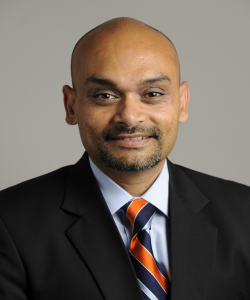
Aditya Singh ’08S (MBA)
Technology Strategist, Microsoft
By Bret Ellington
Aditya Singh is no stranger to industry-disrupting events and discoveries. Throughout his career he has adapted to change, pivoting when necessary, and always learning new skills to evolve with technological advancements. He sees the current wave of generative AI technology as the revolution that will disrupt business and even change our way of life. “Think about the strides AI has made in the last 60 to 70 years since its invention; it has evolved more than four times that in the last year,” he said. “We will all have to substantially adapt our thinking within the next half decade.”
In his position as technology strategist at Microsoft, Singh said he uses generative AI in several ways, including utilizing M365 Copilot, an artificial intelligence assistant feature he said—as the name suggests—is like his copilot or an AI assistant that helps him follow up on actions, summarize meetings, take notes, and set reminders.
“I also create AI demos for my customers to show how easy it is to create useful applications utilizing the power of our large language models and other AI technologies,” says Singh. Singh began his career in the technology field at a time when the ability to adapt was a necessity. Major macro-level shifts were starting to take place in the tech landscape. In fact, the entire world was changing. He arrived in the US to attend graduate school in computer science at the beginning of the post-9/11 era. “I was on the West Coast when it happened,” he remembers. “My first day in this country I watched it live on TV, and I will never forget that horrific image of the second tower actually coming down.”
Two years later, he entered the job market in the aftermath of the dot-com bubble burst. Equipped with an MS in computer science from UC–Santa Barbara and a year of prior work experience with a satellite company in India, Singh had a solid foundation to pursue a career in technology. He decided to complement his tech expertise with an MBA. “I was looking for a complete change in my specialization, but some things would always remain the same, like my love of numbers and technology,” he said. “At the time, financial markets were doing fairly well, and New York City and the East Coast was the place to be if you were quantitatively inclined.” | "I was on the West Coast when [the 9/11 attacks] happened. My first day in this country I watched it live on TV, and I will never forget that horrific image of the second tower actually coming down."
—Aditya Singh ’08S (MBA) |
After graduating from Simon, Singh entered the world of risk management, eventually transitioning to sales at Moody's, where he covered various territories over a decade. During this period, he recognized a new technological transformation—the advent of public cloud computing, spearheaded by companies like Amazon. This prompted a pivotal move back to the tech industry.
In 2018, Singh joined Microsoft and started his current role as sales executive and technology strategist. In this role, he serves as a trusted advisor to customers, primarily within financial institutions. He works closely with technical teams and C-level executives to shape their technological vision, leveraging Microsoft's suite of products and innovations, including artificial intelligence. Reflecting on his Simon experience, Singh recognizes how specific courses, professors, and case studies shaped the vision for his career. Courses such as Financial Statement Analysis, Strategy, and Financial Modeling laid the foundation for his understanding of business dynamics. He credits professors Cliff Smith, Charles Wasley, Jim Brickley, Ron Schmidt, and the late Michael Barclay for enriching his business education.
Today, Singh remains actively engaged with Simon, participating in panels and events, and arranging for students and alumni to utilize meeting space at the Microsoft Technology Center in New York City for various events. “Microsoft has a reputation for opening its doors for good causes,” he said. “Not just for Simon, but for many other not-for-profit institutions as well. It’s been a pleasure to be involved in making these arrangements for these types of organizations.” His career trajectory aligns with the rapid advancements in technology, particularly in the field of generative AI. Recognizing the transformative potential of AI models, Singh emphasizes the importance of preparing future business leaders to harness these technologies effectively. He enthusiastically supports Simon’s integration of this technology into the curriculum.
Singh views generative AI as a permanent fixture, and he urges a balanced approach. While embracing AI's potential, he stresses the need for checks and balances to ensure responsible AI adoption, which includes safeguarding data and preserving employee well-being. “Generative AI is here to stay, and we are right to be cautious about how we adopt this technology,” said Singh. “But once we put guardrails in place, then we can maximize potential in our professional and even personal lives by using these tools for what they are for, which is to benefit mankind.” When asked about the implications for generative AI in his own field, he says he is optimistic that the technology will have positive impact in his area of work. “The current set of AI tools are designed to perform repetitive tasks with ease and are also especially good in conversational capabilities. They can also be used to create compelling pitches as well as write computer code,” he said. “If used the right way, it can be used as a powerful tool to make you more productive in your day-to-day tasks.”
Singh looks forward to the profound impact of generative AI on business and society. His optimism lies in the belief that, with responsible and informed use, AI can work for individuals and organizations—ushering in a new era of possibilities.
